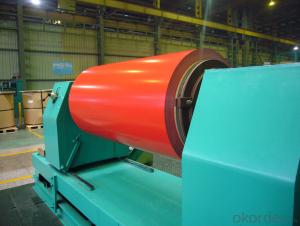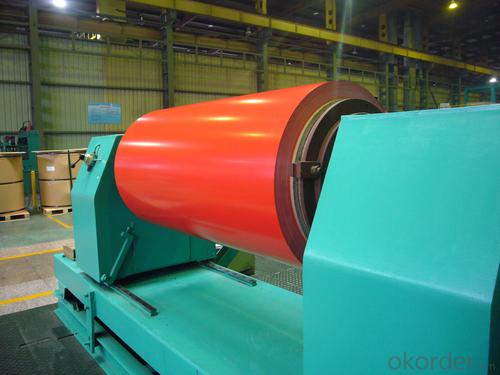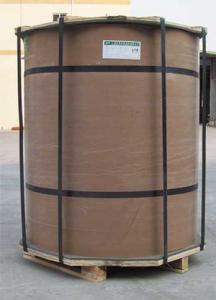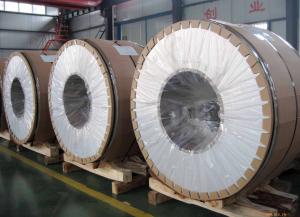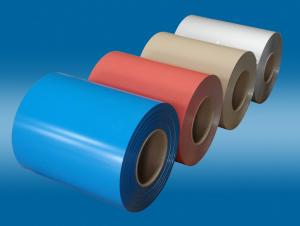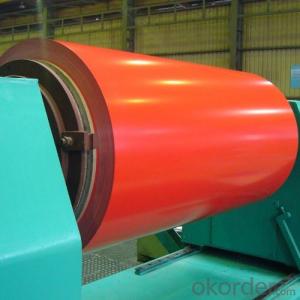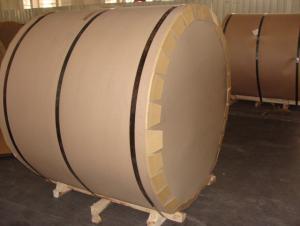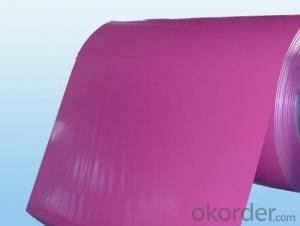PE Coated Gutter Aluminum Coil-3XXX
- Loading Port:
- China Main Port
- Payment Terms:
- TT OR LC
- Min Order Qty:
- -
- Supply Capability:
- -
OKorder Service Pledge
OKorder Financial Service
You Might Also Like
Product Description:
1 Specifications of PE Coated Aluminum Coil/Sheet
Alloy | AA1050,AA1060, AA1070, AA1100, AA3003, AA3004, AA3005, AA3105, AA5005, AA5052, AA5754, AA5083, AA8011 |
Temper: | H12, H14, H16, H18, H22, H24, H26, H32,HO, F |
Thickness: | 0.10-4.0mm |
Width: | 10mm- 2000mm |
Coating | PE(Polyester) |
Painting Thickness | Standard 16-25 microns, max 40 microns |
Color | Acording to Ral colors or customer’s samples |
Standard: | GB/T17748-1999, ASTM, ISO, EU standard |
Special Specification is available on customer’s requirement | |
PE(polyester) Coating
PE(polyester) coating:high molecular polymer as monomer and addition of alkyd, is an UV-resistant coating. It can be classified matt and glossy according to coating gloss. The compact molecule structure, makes paint surface luster and smooth,which assure good printing on the panel surface. With an warranty of 8-10 years for weather resistance, it is specially applied for internal decoration and sign board.
2 Usage/Applications of PE Coated Aluminum Coil/Sheet
Our company's PE Coated Aluminum Coil/Sheet have been widely used in the fields of construction and decoration(garage doors, ceiling etc.), electronic appliances, lighting decoration, air-condition air pipe, sanwich panels and drainage, etc.
- Q: Are aluminum coils suitable for electrical conductivity?
- Indeed, aluminum coils prove to be suitable for electrical conductivity. With its conductivity rating at approximately 62% of the International Annealed Copper Standard (IACS), aluminum stands as a highly conductive material. Consequently, aluminum coils emerge as an exceptional choice for a variety of electrical applications, encompassing power transmission and distribution, electrical motors, and transformers. Furthermore, aluminum coils present a range of advantages, including their lightweight nature, high resistance to corrosion, and lower cost in comparison to copper coils. Nevertheless, it is crucial to acknowledge that aluminum exhibits a lower conductivity than copper, thus potentially necessitating larger aluminum coils to attain the same level of conductivity as smaller copper coils. In summary, aluminum coils remain a viable and frequently employed option for electrical conductivity.
- Q: This question asks about potential health hazards associated with the use of aluminum coils.
- <p>There are concerns regarding the use of aluminum coils, particularly in cooking and food preparation, due to the potential for aluminum to leach into food. While aluminum is generally recognized as safe, excessive intake over a long period has been linked to various health issues, including neurological disorders and cognitive impairment. However, the risk is considered low for most people, as the body does not absorb a significant amount of aluminum from food or cookware. It's important to note that the scientific community has not reached a consensus on the extent of these risks, and further research is needed. To minimize potential exposure, it's recommended to use alternative cookware materials like stainless steel or cast iron, especially for acidic foods that may increase aluminum leaching.</p>
- Q: Are aluminum coils resistant to UV radiation?
- Generally, aluminum coils have resistance to UV radiation. Aluminum is a material known for its high durability and resistance to corrosion. It possesses innate properties that shield it from the harmful impacts of UV radiation. Unlike some other metals, aluminum does not undergo oxidation or deterioration when exposed to sunlight over long durations. This characteristic renders it an excellent option for applications that involve UV exposure, including outdoor structures, solar panels, and automotive components. Nonetheless, it is crucial to acknowledge that although aluminum can withstand UV radiation, it may still experience degradation if not adequately protected or maintained.
- Q: What is an aluminum coil and what is it used for?
- An aluminum coil is a long, flat, and thin sheet of aluminum that is rolled up into a coil shape. It is typically made from high-quality aluminum alloys that are durable, lightweight, and corrosion-resistant. Aluminum coils have a wide range of applications across various industries. One of the most common uses is in the manufacturing of aluminum products, such as cans, containers, and packaging materials. The flexibility and malleability of aluminum coils make them ideal for shaping into different forms and sizes. Additionally, aluminum coils are extensively used in the construction industry for various purposes. They are commonly used for roofing, siding, gutters, and other exterior applications due to their ability to withstand harsh weather conditions and resist corrosion. The lightweight nature of aluminum coils makes them easier to handle and install, reducing labor and transportation costs. Moreover, aluminum coils are also used in heating, ventilation, and air conditioning (HVAC) systems. They are utilized in the production of condenser and evaporator coils, which are crucial components for controlling temperature and humidity in residential, commercial, and industrial buildings. In summary, an aluminum coil is a versatile and valuable material that finds widespread use in numerous industries. Its lightweight, corrosion-resistant, and malleable properties make it an excellent choice for manufacturing aluminum products, as well as for construction and HVAC applications.
- Q: I know aluminum has 3 valence electrons and oxygen has 7, but if anyone could explain the chemical formula to me it would be great.
- You are right about aluminum having 3 valence electrons, but oxygen has 6. Oxygen wants two more to get to 8. So the ions are Al +3 and O-2. The formula is Al2O3
- Q: Is it possible to use aluminum coils for storage purposes?
- <p>Yes, aluminum coils can be used for storage, particularly for certain applications. They are often used in HVAC systems and electrical wiring due to their conductivity and flexibility. For general storage, aluminum coils may be suitable for winding and storing cables, wires, or similar materials. However, for storing items that require a specific environment or have weight concerns, it's important to consider the coil's strength and whether it can provide the necessary support and protection. Always ensure that the storage method complies with safety standards and the material's properties.</p>
- Q: Are there any restrictions on the coil length of aluminum coils?
- Yes, there are restrictions on the coil length of aluminum coils. The maximum coil length is typically determined by the capabilities of the equipment used for coil production and handling. Factors such as the size and capacity of coil winding machines, transportation and storage limitations, and the weight and stability of the coil itself all play a role in determining the maximum coil length. Additionally, longer coils may be more prone to handling and logistical issues, such as increased risk of damage during transportation or difficulties in uncoiling and processing. Therefore, it is important to consider these restrictions and limitations when determining the appropriate coil length for aluminum coils.
- Q: What are the potential health hazards associated with the use of old aluminum coils?
- <p>Using old aluminum coils can pose health risks due to potential leaching of aluminum into food or beverages. Long-term exposure to aluminum may lead to cognitive impairments and neurological issues. Additionally, old coils may have accumulated dirt, bacteria, or other contaminants that could cause infections or digestive problems. It's important to regularly inspect and replace aluminum cookware to ensure safety.</p>
- Q: Is it possible to utilize an electric iron that features an aluminum coil heater?
- <p>Yes, you can use an electric iron with an aluminum coil heater. Aluminum coil heaters are commonly used in electric irons due to their excellent heat conductivity and quick heat-up time. They distribute heat evenly and maintain a consistent temperature, making them ideal for ironing. However, it's important to follow the manufacturer's guidelines for use and maintenance to ensure safety and longevity of the iron.</p>
- Q: I am concerned about the environment so I collect empty aluminum cans off the street when I walk my dog. Right now I have 3 large garbage bags full of crushed aluminum can. The problem is... some of the cans have dirt on and in them. Some of thoroughly flattened ones may even have small pebbles embedded in them. Will these be accepted at the recycling facility? I'm guessing it doesn't matter because when they melt them any organic materials will burn away and any dirt particles or small pebbles will be separated from the molten aluminum. What do you think?
- No problem with dirt and dust.
Send your message to us
PE Coated Gutter Aluminum Coil-3XXX
- Loading Port:
- China Main Port
- Payment Terms:
- TT OR LC
- Min Order Qty:
- -
- Supply Capability:
- -
OKorder Service Pledge
OKorder Financial Service
Similar products
Hot products
Hot Searches
Related keywords
